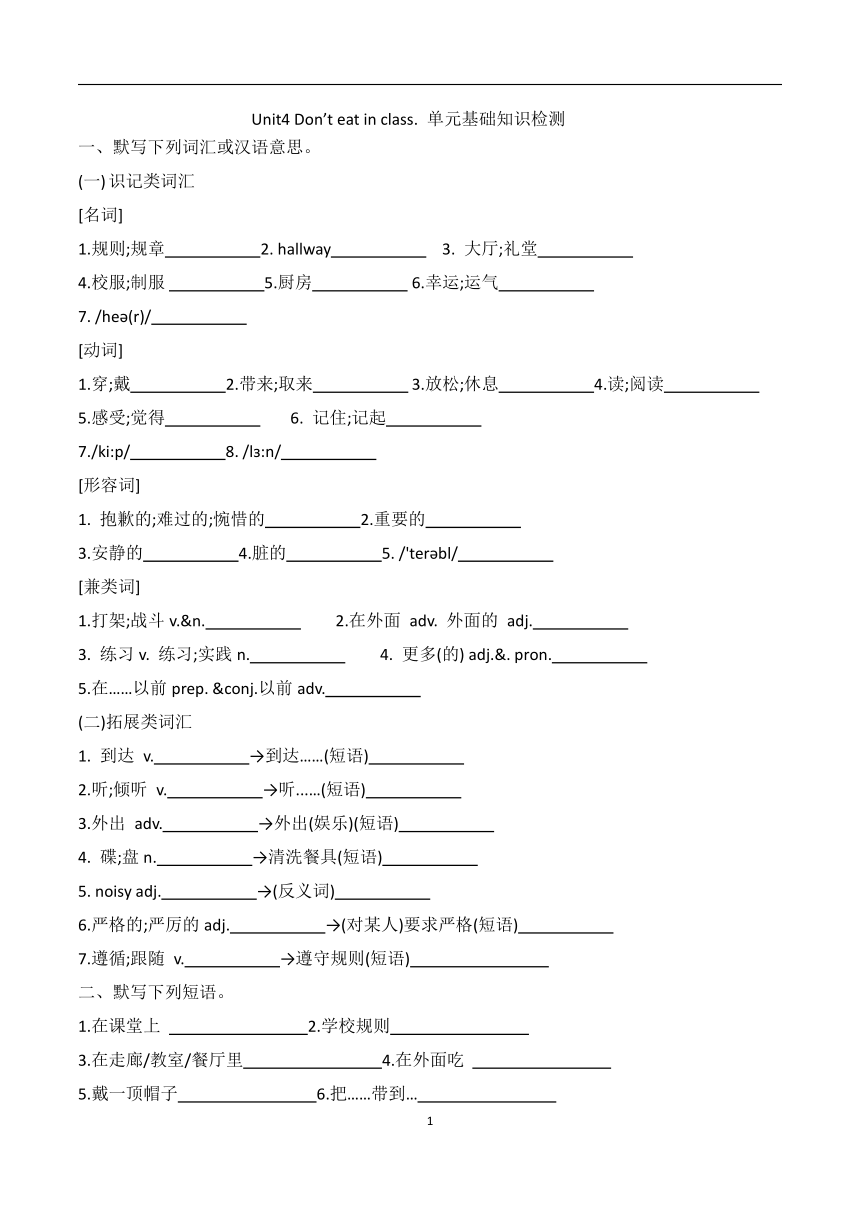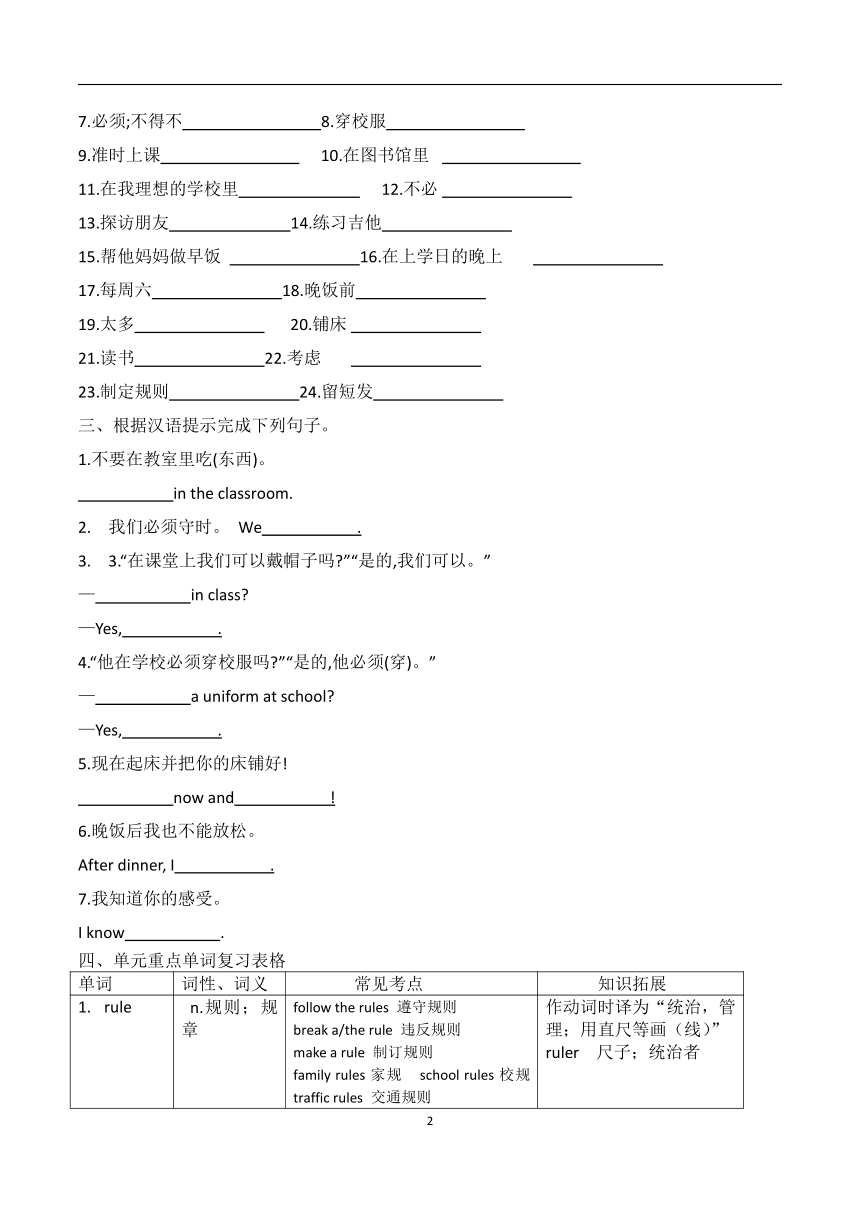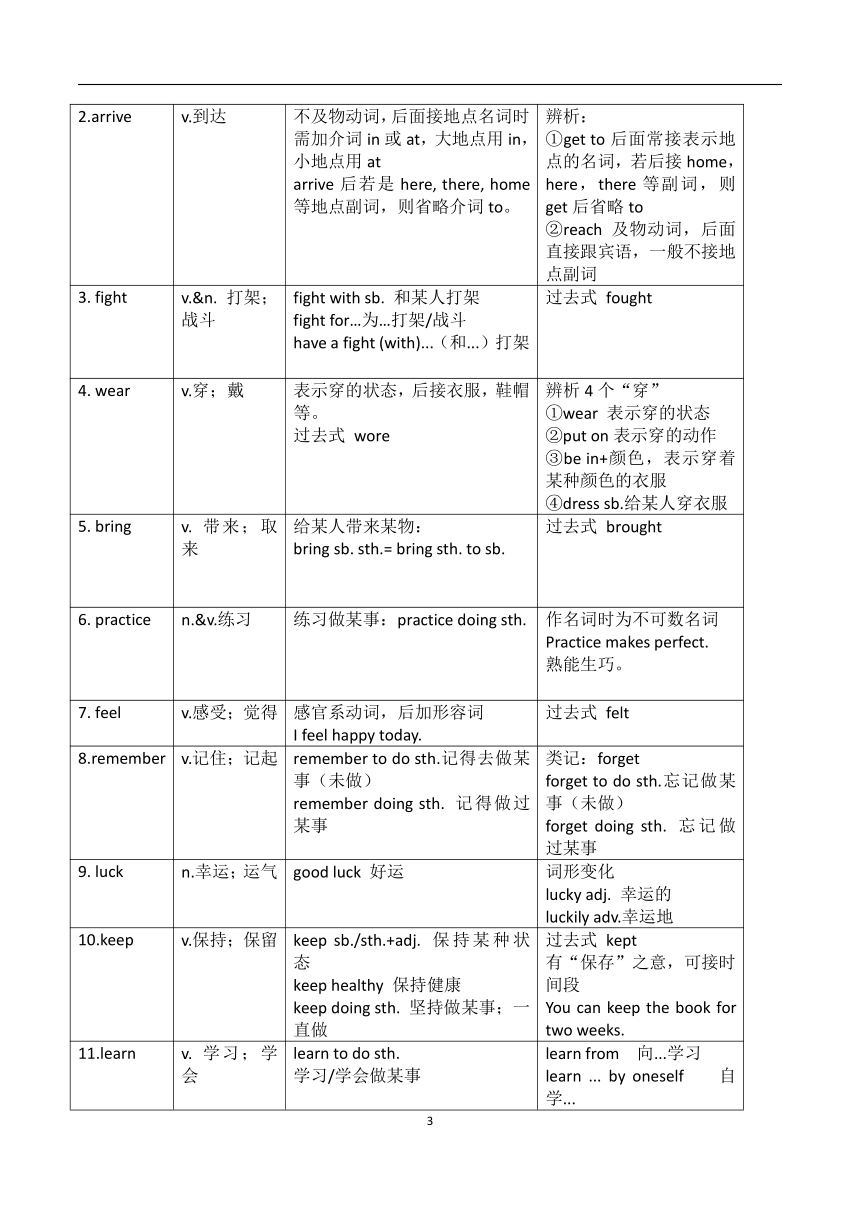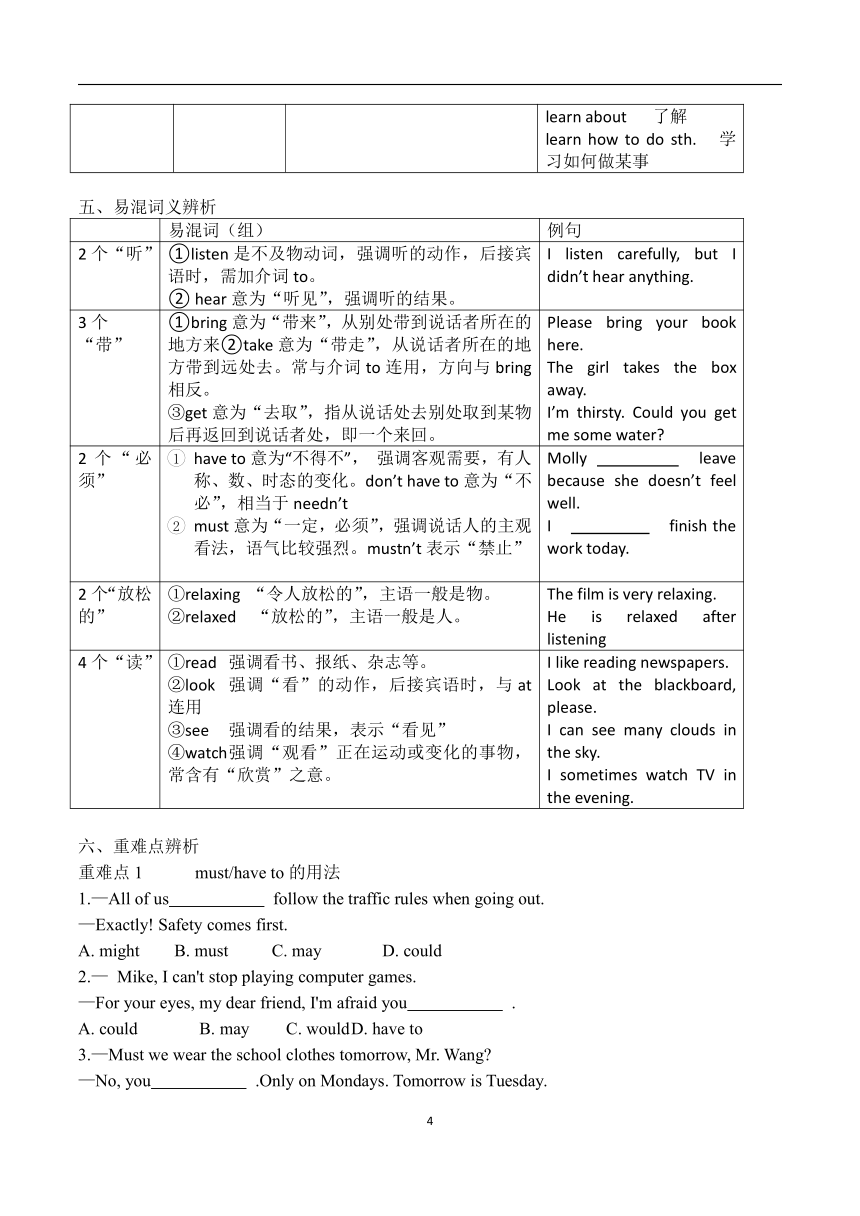人教版七年级下册unit4 Don't eat in class. 基础知识梳理及练习(含答案)
文档属性
| 名称 | 人教版七年级下册unit4 Don't eat in class. 基础知识梳理及练习(含答案) |  | |
| 格式 | docx | ||
| 文件大小 | 42.6KB | ||
| 资源类型 | 教案 | ||
| 版本资源 | 人教新目标(Go for it)版 | ||
| 科目 | 英语 | ||
| 更新时间 | 2024-03-12 16:00:01 | ||
图片预览




文档简介
Unit4 Don’t eat in class. 单元基础知识检测
默写下列词汇或汉语意思。
识记类词汇
[名词]
1.规则;规章 2. hallway 3. 大厅;礼堂
4.校服;制服 5.厨房 6.幸运;运气
7. /he (r)/
[动词]
1.穿;戴 2.带来;取来 3.放松;休息 4.读;阅读
5.感受;觉得 6. 记住;记起
7./ki:p/ 8. /l :n/
[形容词]
1. 抱歉的;难过的;惋惜的 2.重要的
3.安静的 4.脏的 5. /'ter bl/
[兼类词]
1.打架;战斗v.&n. 2.在外面 adv. 外面的 adj.
3. 练习v. 练习;实践n. 4. 更多(的) adj.&. pron.
5.在……以前prep. &conj.以前adv.
(二)拓展类词汇
1. 到达 v. →到达……(短语)
2.听;倾听 v. →听...…(短语)
3.外出 adv. →外出(娱乐)(短语)
4. 碟;盘n. →清洗餐具(短语)
5. noisy adj. →(反义词)
6.严格的;严厉的adj. →(对某人)要求严格(短语)
7.遵循;跟随 v. →遵守规则(短语)
二、默写下列短语。
1.在课堂上 2.学校规则
3.在走廊/教室/餐厅里 4.在外面吃
5.戴一顶帽子 6.把……带到…
7.必须;不得不 8.穿校服
9.准时上课 10.在图书馆里
11.在我理想的学校里 12.不必
13.探访朋友 14.练习吉他
15.帮他妈妈做早饭 16.在上学日的晚上
17.每周六 18.晚饭前
19.太多 20.铺床
21.读书 22.考虑
23.制定规则 24.留短发
根据汉语提示完成下列句子。
1.不要在教室里吃(东西)。
in the classroom.
我们必须守时。 We .
3.“在课堂上我们可以戴帽子吗 ”“是的,我们可以。”
— in class
—Yes, .
4.“他在学校必须穿校服吗 ”“是的,他必须(穿)。”
— a uniform at school
—Yes, .
5.现在起床并把你的床铺好!
now and !
6.晚饭后我也不能放松。
After dinner, I .
7.我知道你的感受。
I know .
四、单元重点单词复习表格
单词 词性、词义 常见考点 知识拓展
rule n.规则;规章 follow the rules 遵守规则 break a/the rule 违反规则 make a rule 制订规则 family rules家规 school rules校规 traffic rules 交通规则 作动词时译为“统治,管理;用直尺等画(线)” ruler 尺子;统治者
2.arrive v.到达 不及物动词,后面接地点名词时需加介词in或at,大地点用in,小地点用at arrive后若是here, there, home等地点副词,则省略介词to。 辨析: ①get to后面常接表示地点的名词,若后接home,here,there等副词,则get后省略to ②reach 及物动词,后面直接跟宾语,一般不接地点副词
3. fight v.&n. 打架;战斗 fight with sb. 和某人打架 fight for…为…打架/战斗 have a fight (with)...(和...)打架 过去式 fought
4. wear v.穿;戴 表示穿的状态,后接衣服,鞋帽等。 过去式 wore 辨析4个“穿” ①wear 表示穿的状态 ②put on表示穿的动作 ③be in+颜色,表示穿着某种颜色的衣服 ④dress sb.给某人穿衣服
5. bring v. 带来;取来 给某人带来某物: bring sb. sth.= bring sth. to sb. 过去式 brought
6. practice n.&v.练习 练习做某事:practice doing sth. 作名词时为不可数名词 Practice makes perfect. 熟能生巧。
7. feel v.感受;觉得 感官系动词,后加形容词 I feel happy today. 过去式 felt
8.remember v.记住;记起 remember to do sth.记得去做某事(未做) remember doing sth. 记得做过某事 类记:forget forget to do sth.忘记做某事(未做) forget doing sth. 忘记做过某事
9. luck n.幸运;运气 good luck 好运 词形变化 lucky adj. 幸运的 luckily adv.幸运地
10.keep v.保持;保留 keep sb./sth.+adj. 保持某种状态 keep healthy 保持健康 keep doing sth. 坚持做某事;一直做 过去式 kept 有“保存”之意,可接时间段 You can keep the book for two weeks.
11.learn v. 学习;学会 learn to do sth. 学习/学会做某事 learn from 向...学习 learn ... by oneself 自学... learn about 了解 learn how to do sth. 学习如何做某事
五、易混词义辨析
易混词(组) 例句
2个“听” ①listen是不及物动词,强调听的动作,后接宾语时,需加介词to。 ② hear意为“听见”,强调听的结果。 I listen carefully, but I didn’t hear anything.
3个 “带” ①bring意为“带来”,从别处带到说话者所在的地方来②take意为“带走”,从说话者所在的地方带到远处去。常与介词to连用,方向与bring相反。 ③get意为“去取”,指从说话处去别处取到某物后再返回到说话者处,即一个来回。 Please bring your book here. The girl takes the box away. I’m thirsty. Could you get me some water
2个“必须” have to意为“不得不”, 强调客观需要,有人称、数、时态的变化。don’t have to意为“不必”,相当于needn’t must意为“一定,必须”,强调说话人的主观看法,语气比较强烈。mustn’t表示“禁止” Molly leave because she doesn’t feel well. I finish the work today.
2个“放松的” ①relaxing “令人放松的”,主语一般是物。 ②relaxed “放松的”,主语一般是人。 The film is very relaxing. He is relaxed after listening
4个“读” ①read 强调看书、报纸、杂志等。 ②look 强调“看”的动作,后接宾语时,与at连用 ③see 强调看的结果,表示“看见” ④watch 强调“观看”正在运动或变化的事物,常含有“欣赏”之意。 I like reading newspapers. Look at the blackboard, please. I can see many clouds in the sky. I sometimes watch TV in the evening.
六、重难点辨析
重难点1 must/have to的用法
1.—All of us follow the traffic rules when going out.
—Exactly! Safety comes first.
A. might B. must C. may D. could
2.— Mike, I can't stop playing computer games.
—For your eyes, my dear friend, I'm afraid you .
A. could B. may C. would D. have to
3.—Must we wear the school clothes tomorrow, Mr. Wang
—No, you .Only on Mondays. Tomorrow is Tuesday.
A. mustn't B. needn't C.can't
4. 我们周一必须穿校服。
We wear school uniforms on Mondays.
重难点2 too many/too much/much too辨析
1. Lily runs (太) fast. She's like a car.
2. I'm not free because I have (太多) homework to do every day.
3. There are people in the store on Sundays.
A. too much B. too many C. much too D. many too
重难点3 relax/relaxed/relaxing辨析
1. I love the game shows because they are very (relax).
2. 你晚上怎么放松一下
How you in the even- ing
3.听完音乐后,他感到轻松。
He after listening to music.
重难点 4 strict的用法
1. My parents are always (严格的) with me.
2. My English teacher is always strict me.
A.in B. at C. with D. about
3.Our teacher is strict us our study.
A. with; in B. in; with C. with; for D. in; at
重难点5 remember to do sth./remember doing sth.辨析
1.—Peter always remembers the light off when he leaves the room.
— That's great. It's a good way to save energy.
A. shut B. shutting C. to shut
2.我记得在这个城市见过她。
I her in the city.
3.当你到那里时,记得给我打电话。
telephone me when you arrive there.
七、语法知识练习
祈使句的用法
一、用括号中所给单词的适当形式填空。
1. (make) your bed right now.
2. Please (not be) late.
3. (not talk) in class.
4. No (swim)!
5. “Please be quiet. No (talk) says our teacher.
6. Lily, (taste) the fruit salad please.
二、单项选择。
1. Boys and girls, learning an have fun!
A. keep B. to keep C. keeping D. kept
2.— Sam, run in the hallways. It's very dangerous.
—Sorry, Ms. Black.
A. do B. don't C. not D. doesn't
3. Tom, talk loudly in the library. It's impolite.
A. do B. don't C. must D. mustn't
4. Do you want to be healthy Smiling can help you stay healthy.
A. Keep. B. Keeping. C. To keep. D. Kept.
5.— dressed now. We have to go in ten minutes.
— OK, Mom.
A. Getting B. Get C. To get D. Gets
6.— silent, please! You are in the library.
— I'm sorry, madam.
A. Keep B. To keep C. Keeping D. Kept
三、根据提示将下列句子译成英语。
1. 上课不要迟到。(arrive/be late for)
孩子们,到这儿来。(come)
在教室里要保持安静。(be/keep quiet)
4.晚饭后不要看电视。要做作业。(do one's homework)
四、句型转换。
1. You must eat in the dining hall.(改为祈使句)
the dining hall.
2. You can't listen to music in the classroom.(改为祈使句)
to music in the class-room.
3. Don't come to my house tomorrow.(改为肯定句)
my house tomorrow.
4. Wear glasses.(改为否定句)
glasses.
Unit 4 默写知识梳理答案
一、(一)[名词] 1.rule 2. 走廊;过道3. hall 4. uniform 5. kitchen 6. luck7. hair
[动词] 1. wear 2. bring 3.relax 4. read
5. feel 6. remember 7. keep 8. learn
[形容词] 1. sorry 2. important 3. quiet
4. dirty 5. terrible
[兼类词] 1. fight 2. outside 3. practice
4. more 5. before
(二)1. arrive; arrive in/at ...
2. listen; listen to ... 3. out; go out 4. dish; do the dishes
5. 吵闹的;quiet 6. strict; be strict(with sb. )7. follow; follow the rules
二、1. in class 2. school rules 3. in the hallways/classroom/dining hall
4. eat outside5. wear a hat 6. bring ... to ....7. have to
8. wear the school uniform 9. be on time for class
10. in the library11. at my dream school 12. don't have to
13. see friends14. practice the guitar
15. help his mom make breakfast 16. on school nights
17. every Saturday18. before dinner19. too many
20. make one's bed21. read a book22.think about
23. make rules24. keep hair short
三、1. Don't eat2. must be on time3. Can we wear a hat; we can
4. Does he have to wear; he does5. Get up; make your bed
6. can't relax either7. how you feel
六、重难点1
1.B might 也许,是may的过去式或委婉形式;must-定;may 也许,可以;could 是can的过去式或委婉形式。由答句句意可知,本句句意为:我们所有人出门都必须遵守交通规则。
2.D 句意:“Mike,我忍不住要玩电脑游戏。”“亲爱的朋
友,为了你的眼睛,恐怕你必须(要停下来)。”could能够;may 可以,或许;would将要;have to必须。
3.B 句意:“王老师,我们明天必须穿校服吗 ”“不,你们不必。只在星期一。明天是星期二。”must开头的一般疑问句的否定回答用“No,you needn't.”。
4. have to
重难点2
1. much too2. too much
3.B 句意:在星期天这个店里有太多的人。too much修饰不可数名词;too many修饰可数名词复数。people是可数名词复数,故选B。
重难点3
1. relaxing 2. do; relax3. is/feels relaxed
重难点4
1. strict
2.C 句意:我的英语老师总是对我很严格。be strict withsb.意为“对某人要求严格”。
3.A 句意:我们的老师在学习方面对我们要求很严格。be strict with sb.意为“对某人要求严格”;be strict in sth.意为“对某事要求严格”。
重难点5
1.C 句意: 当 Peter 离开房间时他总是记得关灯。remember to do sth.记得要做某事(未做);rememberdoing sth.记得做过某事(已做)。根据when he leaves the
room 可知,此处是指记得要去关灯。
2. remember seeing 3. Remember to
七、语法练习答案:
答案:
一、1.Make 2. don't be 3. Don't talk4. swimming5. talking 6. taste
二、1.A 句意:孩子们,坚持学习,玩得愉快!本题考查祈使句的肯定句,祈使句的肯定句以动词原形开头。
2.B 句意:“Sam,不要在走廊里跑。这很危险。”“对不起,Black女士。”祈使句的否定句要在句首加 don't。
3.B 句意:Tom,不要在图书馆大声说话。那不礼貌。祈使句的否定句用don't加动词原形构成。
4.A 句意:你想要健康吗 微笑吧。保持微笑能帮助你保持健康。此处是祈使句,祈使句要以动词原形开头。
5.B 句意:“现在穿好衣服。十分钟后我们得走了。”“好的,妈妈。”祈使句以动词原形开头。
6.A 句意:“请保持安静!你是在图书馆里。”“对不起,
夫人。”根据空白处所在句子可知,该句应是一个祈使句,祈使句应以动词原形开头。
三、1.Don't arrive/be late for class. 2. Come here, children.
3.Be/Keep quiet in the classroom. 4.Don't watch TV after dinner. Do your homework.
四、1.Eat in 2. Don't e to 4.Don't wear
2
默写下列词汇或汉语意思。
识记类词汇
[名词]
1.规则;规章 2. hallway 3. 大厅;礼堂
4.校服;制服 5.厨房 6.幸运;运气
7. /he (r)/
[动词]
1.穿;戴 2.带来;取来 3.放松;休息 4.读;阅读
5.感受;觉得 6. 记住;记起
7./ki:p/ 8. /l :n/
[形容词]
1. 抱歉的;难过的;惋惜的 2.重要的
3.安静的 4.脏的 5. /'ter bl/
[兼类词]
1.打架;战斗v.&n. 2.在外面 adv. 外面的 adj.
3. 练习v. 练习;实践n. 4. 更多(的) adj.&. pron.
5.在……以前prep. &conj.以前adv.
(二)拓展类词汇
1. 到达 v. →到达……(短语)
2.听;倾听 v. →听...…(短语)
3.外出 adv. →外出(娱乐)(短语)
4. 碟;盘n. →清洗餐具(短语)
5. noisy adj. →(反义词)
6.严格的;严厉的adj. →(对某人)要求严格(短语)
7.遵循;跟随 v. →遵守规则(短语)
二、默写下列短语。
1.在课堂上 2.学校规则
3.在走廊/教室/餐厅里 4.在外面吃
5.戴一顶帽子 6.把……带到…
7.必须;不得不 8.穿校服
9.准时上课 10.在图书馆里
11.在我理想的学校里 12.不必
13.探访朋友 14.练习吉他
15.帮他妈妈做早饭 16.在上学日的晚上
17.每周六 18.晚饭前
19.太多 20.铺床
21.读书 22.考虑
23.制定规则 24.留短发
根据汉语提示完成下列句子。
1.不要在教室里吃(东西)。
in the classroom.
我们必须守时。 We .
3.“在课堂上我们可以戴帽子吗 ”“是的,我们可以。”
— in class
—Yes, .
4.“他在学校必须穿校服吗 ”“是的,他必须(穿)。”
— a uniform at school
—Yes, .
5.现在起床并把你的床铺好!
now and !
6.晚饭后我也不能放松。
After dinner, I .
7.我知道你的感受。
I know .
四、单元重点单词复习表格
单词 词性、词义 常见考点 知识拓展
rule n.规则;规章 follow the rules 遵守规则 break a/the rule 违反规则 make a rule 制订规则 family rules家规 school rules校规 traffic rules 交通规则 作动词时译为“统治,管理;用直尺等画(线)” ruler 尺子;统治者
2.arrive v.到达 不及物动词,后面接地点名词时需加介词in或at,大地点用in,小地点用at arrive后若是here, there, home等地点副词,则省略介词to。 辨析: ①get to后面常接表示地点的名词,若后接home,here,there等副词,则get后省略to ②reach 及物动词,后面直接跟宾语,一般不接地点副词
3. fight v.&n. 打架;战斗 fight with sb. 和某人打架 fight for…为…打架/战斗 have a fight (with)...(和...)打架 过去式 fought
4. wear v.穿;戴 表示穿的状态,后接衣服,鞋帽等。 过去式 wore 辨析4个“穿” ①wear 表示穿的状态 ②put on表示穿的动作 ③be in+颜色,表示穿着某种颜色的衣服 ④dress sb.给某人穿衣服
5. bring v. 带来;取来 给某人带来某物: bring sb. sth.= bring sth. to sb. 过去式 brought
6. practice n.&v.练习 练习做某事:practice doing sth. 作名词时为不可数名词 Practice makes perfect. 熟能生巧。
7. feel v.感受;觉得 感官系动词,后加形容词 I feel happy today. 过去式 felt
8.remember v.记住;记起 remember to do sth.记得去做某事(未做) remember doing sth. 记得做过某事 类记:forget forget to do sth.忘记做某事(未做) forget doing sth. 忘记做过某事
9. luck n.幸运;运气 good luck 好运 词形变化 lucky adj. 幸运的 luckily adv.幸运地
10.keep v.保持;保留 keep sb./sth.+adj. 保持某种状态 keep healthy 保持健康 keep doing sth. 坚持做某事;一直做 过去式 kept 有“保存”之意,可接时间段 You can keep the book for two weeks.
11.learn v. 学习;学会 learn to do sth. 学习/学会做某事 learn from 向...学习 learn ... by oneself 自学... learn about 了解 learn how to do sth. 学习如何做某事
五、易混词义辨析
易混词(组) 例句
2个“听” ①listen是不及物动词,强调听的动作,后接宾语时,需加介词to。 ② hear意为“听见”,强调听的结果。 I listen carefully, but I didn’t hear anything.
3个 “带” ①bring意为“带来”,从别处带到说话者所在的地方来②take意为“带走”,从说话者所在的地方带到远处去。常与介词to连用,方向与bring相反。 ③get意为“去取”,指从说话处去别处取到某物后再返回到说话者处,即一个来回。 Please bring your book here. The girl takes the box away. I’m thirsty. Could you get me some water
2个“必须” have to意为“不得不”, 强调客观需要,有人称、数、时态的变化。don’t have to意为“不必”,相当于needn’t must意为“一定,必须”,强调说话人的主观看法,语气比较强烈。mustn’t表示“禁止” Molly leave because she doesn’t feel well. I finish the work today.
2个“放松的” ①relaxing “令人放松的”,主语一般是物。 ②relaxed “放松的”,主语一般是人。 The film is very relaxing. He is relaxed after listening
4个“读” ①read 强调看书、报纸、杂志等。 ②look 强调“看”的动作,后接宾语时,与at连用 ③see 强调看的结果,表示“看见” ④watch 强调“观看”正在运动或变化的事物,常含有“欣赏”之意。 I like reading newspapers. Look at the blackboard, please. I can see many clouds in the sky. I sometimes watch TV in the evening.
六、重难点辨析
重难点1 must/have to的用法
1.—All of us follow the traffic rules when going out.
—Exactly! Safety comes first.
A. might B. must C. may D. could
2.— Mike, I can't stop playing computer games.
—For your eyes, my dear friend, I'm afraid you .
A. could B. may C. would D. have to
3.—Must we wear the school clothes tomorrow, Mr. Wang
—No, you .Only on Mondays. Tomorrow is Tuesday.
A. mustn't B. needn't C.can't
4. 我们周一必须穿校服。
We wear school uniforms on Mondays.
重难点2 too many/too much/much too辨析
1. Lily runs (太) fast. She's like a car.
2. I'm not free because I have (太多) homework to do every day.
3. There are people in the store on Sundays.
A. too much B. too many C. much too D. many too
重难点3 relax/relaxed/relaxing辨析
1. I love the game shows because they are very (relax).
2. 你晚上怎么放松一下
How you in the even- ing
3.听完音乐后,他感到轻松。
He after listening to music.
重难点 4 strict的用法
1. My parents are always (严格的) with me.
2. My English teacher is always strict me.
A.in B. at C. with D. about
3.Our teacher is strict us our study.
A. with; in B. in; with C. with; for D. in; at
重难点5 remember to do sth./remember doing sth.辨析
1.—Peter always remembers the light off when he leaves the room.
— That's great. It's a good way to save energy.
A. shut B. shutting C. to shut
2.我记得在这个城市见过她。
I her in the city.
3.当你到那里时,记得给我打电话。
telephone me when you arrive there.
七、语法知识练习
祈使句的用法
一、用括号中所给单词的适当形式填空。
1. (make) your bed right now.
2. Please (not be) late.
3. (not talk) in class.
4. No (swim)!
5. “Please be quiet. No (talk) says our teacher.
6. Lily, (taste) the fruit salad please.
二、单项选择。
1. Boys and girls, learning an have fun!
A. keep B. to keep C. keeping D. kept
2.— Sam, run in the hallways. It's very dangerous.
—Sorry, Ms. Black.
A. do B. don't C. not D. doesn't
3. Tom, talk loudly in the library. It's impolite.
A. do B. don't C. must D. mustn't
4. Do you want to be healthy Smiling can help you stay healthy.
A. Keep. B. Keeping. C. To keep. D. Kept.
5.— dressed now. We have to go in ten minutes.
— OK, Mom.
A. Getting B. Get C. To get D. Gets
6.— silent, please! You are in the library.
— I'm sorry, madam.
A. Keep B. To keep C. Keeping D. Kept
三、根据提示将下列句子译成英语。
1. 上课不要迟到。(arrive/be late for)
孩子们,到这儿来。(come)
在教室里要保持安静。(be/keep quiet)
4.晚饭后不要看电视。要做作业。(do one's homework)
四、句型转换。
1. You must eat in the dining hall.(改为祈使句)
the dining hall.
2. You can't listen to music in the classroom.(改为祈使句)
to music in the class-room.
3. Don't come to my house tomorrow.(改为肯定句)
my house tomorrow.
4. Wear glasses.(改为否定句)
glasses.
Unit 4 默写知识梳理答案
一、(一)[名词] 1.rule 2. 走廊;过道3. hall 4. uniform 5. kitchen 6. luck7. hair
[动词] 1. wear 2. bring 3.relax 4. read
5. feel 6. remember 7. keep 8. learn
[形容词] 1. sorry 2. important 3. quiet
4. dirty 5. terrible
[兼类词] 1. fight 2. outside 3. practice
4. more 5. before
(二)1. arrive; arrive in/at ...
2. listen; listen to ... 3. out; go out 4. dish; do the dishes
5. 吵闹的;quiet 6. strict; be strict(with sb. )7. follow; follow the rules
二、1. in class 2. school rules 3. in the hallways/classroom/dining hall
4. eat outside5. wear a hat 6. bring ... to ....7. have to
8. wear the school uniform 9. be on time for class
10. in the library11. at my dream school 12. don't have to
13. see friends14. practice the guitar
15. help his mom make breakfast 16. on school nights
17. every Saturday18. before dinner19. too many
20. make one's bed21. read a book22.think about
23. make rules24. keep hair short
三、1. Don't eat2. must be on time3. Can we wear a hat; we can
4. Does he have to wear; he does5. Get up; make your bed
6. can't relax either7. how you feel
六、重难点1
1.B might 也许,是may的过去式或委婉形式;must-定;may 也许,可以;could 是can的过去式或委婉形式。由答句句意可知,本句句意为:我们所有人出门都必须遵守交通规则。
2.D 句意:“Mike,我忍不住要玩电脑游戏。”“亲爱的朋
友,为了你的眼睛,恐怕你必须(要停下来)。”could能够;may 可以,或许;would将要;have to必须。
3.B 句意:“王老师,我们明天必须穿校服吗 ”“不,你们不必。只在星期一。明天是星期二。”must开头的一般疑问句的否定回答用“No,you needn't.”。
4. have to
重难点2
1. much too2. too much
3.B 句意:在星期天这个店里有太多的人。too much修饰不可数名词;too many修饰可数名词复数。people是可数名词复数,故选B。
重难点3
1. relaxing 2. do; relax3. is/feels relaxed
重难点4
1. strict
2.C 句意:我的英语老师总是对我很严格。be strict withsb.意为“对某人要求严格”。
3.A 句意:我们的老师在学习方面对我们要求很严格。be strict with sb.意为“对某人要求严格”;be strict in sth.意为“对某事要求严格”。
重难点5
1.C 句意: 当 Peter 离开房间时他总是记得关灯。remember to do sth.记得要做某事(未做);rememberdoing sth.记得做过某事(已做)。根据when he leaves the
room 可知,此处是指记得要去关灯。
2. remember seeing 3. Remember to
七、语法练习答案:
答案:
一、1.Make 2. don't be 3. Don't talk4. swimming5. talking 6. taste
二、1.A 句意:孩子们,坚持学习,玩得愉快!本题考查祈使句的肯定句,祈使句的肯定句以动词原形开头。
2.B 句意:“Sam,不要在走廊里跑。这很危险。”“对不起,Black女士。”祈使句的否定句要在句首加 don't。
3.B 句意:Tom,不要在图书馆大声说话。那不礼貌。祈使句的否定句用don't加动词原形构成。
4.A 句意:你想要健康吗 微笑吧。保持微笑能帮助你保持健康。此处是祈使句,祈使句要以动词原形开头。
5.B 句意:“现在穿好衣服。十分钟后我们得走了。”“好的,妈妈。”祈使句以动词原形开头。
6.A 句意:“请保持安静!你是在图书馆里。”“对不起,
夫人。”根据空白处所在句子可知,该句应是一个祈使句,祈使句应以动词原形开头。
三、1.Don't arrive/be late for class. 2. Come here, children.
3.Be/Keep quiet in the classroom. 4.Don't watch TV after dinner. Do your homework.
四、1.Eat in 2. Don't e to 4.Don't wear
2
同课章节目录
- Unit 1 Can you play the guitar?
- Section A
- Section B
- Unit 2 What time do you go to school?
- Section A
- Section B
- Unit 3 How do you get to school?
- Section A
- Section B
- Unit 4 Don't eat in class.
- Section A
- Section B
- Unit 5 Why do you like pandas?
- Section A
- Section B
- Unit 6 I'm watching TV.
- Section A
- Section B
- Review of Units 1-6
- Unit 7 It's raining!
- Section A
- Section B
- Unit 8 Is there a post office near here?
- Section A
- Section B
- Unit 9 What does he look like?
- Section A
- Section B
- Unit 10 I'd like some noodles.
- Section A
- Section B
- Unit 11 How was your school trip?
- Section A
- Section B
- Unit 12 What did you do last weekend?
- Section A
- Section B
